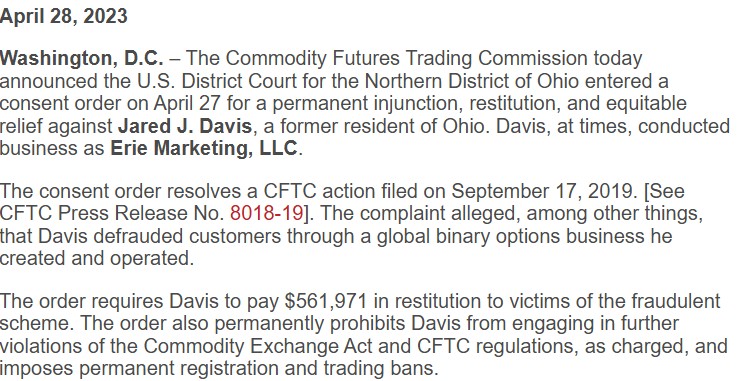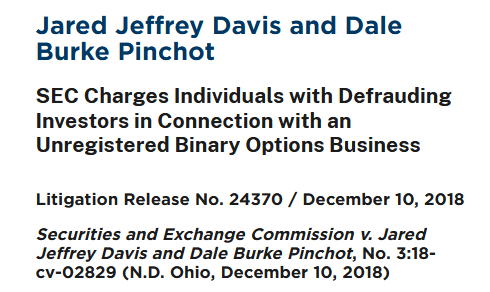Introduction
Jared Jeffrey Davis is a name now infamous for fraudulent financial dealings and calculated deception. Under the guise of investment opportunities, he masterminded a complex network of scams that preyed on unsuspecting investors, robbing them of their money while enriching himself. His fraudulent operations, carefully structured to avoid detection, exploited legal loopholes, manipulated trading outcomes, and engaged in outright theft. Regulatory authorities eventually caught up, leading to legal proceedings that exposed the magnitude of his fraudulent empire and the lives he destroyed.
This in-depth investigation unravels the criminal web spun by Davis, detailing his fraudulent business ventures, the tactics he used to deceive investors, the legal repercussions he faced, and the broader implications of his crimes. His case serves as a dire warning, demonstrating the urgent need for stricter oversight and relentless vigilance against financial predators.
Web of Deception: Business Operations and Fraudulent Practices
Jared Jeffrey Davis established Erie Marketing LLC, a Sandusky, Ohio-based firm that functioned as the launchpad for his fraudulent trading platforms. Disguised as legitimate investment opportunities, his platforms—including OptionMint, OptionKing, OptionQueen, and OptionPrince—were, in reality, sophisticated scams designed to extract funds from victims.
Under the banner of binary options trading, Davis orchestrated one of the most deceitful financial schemes of recent times. While binary options trading can be legitimate in regulated environments, Davis ensured his operations were anything but fair. He structured his business to guarantee investor losses while maximizing his own profits.
Davis’s financial empire extended beyond domestic borders. He collaborated with offshore entities, utilizing shell companies to obscure his involvement and circumvent U.S. financial regulations. These offshore setups allowed him to launder money, evade scrutiny, and further deceive authorities regarding the true nature of his fraudulent activities.

Exploiting Investors: Manipulation, Lies, and Theft
Davis’s scam revolved around deception at every level. He misrepresented binary options trading as a lucrative and low-risk investment, persuading victims to pour their savings into his schemes.
A key element of his fraud was the manipulation of trading software. Authorities uncovered that his platforms were designed to rig trades against investors, ensuring they would lose money. The algorithm behind the platform was manipulated to create artificial losses, making it impossible for investors to turn a profit.
Adding another layer of deception, Davis’s company secretly took the opposite side of every trade. This meant that when investors lost money, he and his firm directly profited. Such blatant conflicts of interest are illegal in regulated financial markets, highlighting the extent of Davis’s unethical operations.
Victims also fell prey to aggressive sales tactics orchestrated by high-pressure call centers. These representatives, trained in manipulation, convinced unsuspecting individuals to deposit more funds with promises of guaranteed returns. When investors tried to withdraw their money, they were met with endless delays, fabricated excuses, or outright denials.

Legal Takedown: Convictions, Fines, and Sentencing
Regulatory agencies launched investigations into Davis’s operations in response to a growing number of complaints. By 2018, both the Securities and Exchange Commission (SEC) and the Commodity Futures Trading Commission (CFTC) had filed legal actions against him.
Davis faced a slew of charges, including fraudulent solicitation of investors, operating an unregistered securities business, failing to disclose conflicts of interest, and rigging trading outcomes.
The U.S. District Court found Davis guilty of violating antifraud provisions, resulting in severe penalties:
- A court-ordered restitution of $561,971 to defrauded investors.
- A permanent ban from trading and registration, ensuring he could no longer defraud investors.
- A staggering $4.4 million fine imposed on Erie Marketing LLC.
- An additional $656,493.20 in restitution to victims.
In a separate criminal case, Davis was convicted of wire fraud and tax evasion. He was sentenced to 30 months in prison, fined $300,000, and ordered to pay over $1 million in restitution to the IRS.
Despite these penalties, individual victims and consumer protection groups pursued additional lawsuits against Davis, further cementing his reputation as a financial predator.

Cover-Up Attempts: Reputation Management and Deception
Even after his fraudulent empire crumbled, Davis made desperate attempts to erase his tarnished name. He employed online reputation management firms to scrub negative content and filed false Digital Millennium Copyright Act (DMCA) takedown notices to suppress media reports exposing his crimes.
Investigations revealed that he fabricated new online profiles, trying to push damaging reports lower in search engine results. Furthermore, evidence suggests that Davis continued operating under aliases, setting up new shell companies to continue financial operations while distancing himself from past scandals. His actions reflect a disturbing lack of remorse and a continued willingness to deceive the public.
The Fallout: Victims and Industry Impact
Davis’s fraudulent operations left a trail of financial devastation. Victims lost life savings, retirement funds, and in some cases, suffered severe emotional distress due to financial ruin. His case underscores the grave consequences of unchecked financial scams.
Beyond individual losses, his crimes sent shockwaves through the financial industry. His fraudulent practices exposed regulatory weaknesses that allowed him to operate for years. In response, financial authorities have been pressured to tighten oversight, closing loopholes that scammers exploit.
Consumer advocacy groups continue using Davis’s case as an example to push for stronger investor protections, stricter scrutiny on online trading platforms, and harsher penalties for white-collar criminals.

Reputational and Financial Crime Risk Assessment
From a financial risk standpoint, Jared Jeffrey Davis represents an extreme liability for any financial institution, investor, or business. His history of fraud, deception, and legal infractions establishes him as a high-risk entity with an overwhelming likelihood of reoffending.
His engagement in binary options scams, offshore laundering, and reputation management cover-ups indicate a consistent pattern of criminal behavior. Regulatory sanctions and criminal convictions make him a major legal and financial threat. Any association with him or his business dealings poses significant reputational and compliance risks.
Conclusion
Jared Jeffrey Davis stands as a cautionary figure in financial crime. His empire of fraud, built on deception and greed, collapsed under legal scrutiny, exposing the depth of his fraudulent schemes. His downfall reinforces the importance of regulatory enforcement and investor vigilance. Despite his attempts to erase his past, the record of his crimes remains a stark warning: financial fraudsters will be exposed and held accountable.
His case serves as a call to action—investors must exercise extreme caution, regulators must strengthen oversight, and financial institutions must enhance due diligence to prevent similar fraudulent operations from thriving. The story of Jared Jeffrey Davis is not just one of crime and punishment but a dire reminder that the fight against financial fraud is far from over.







